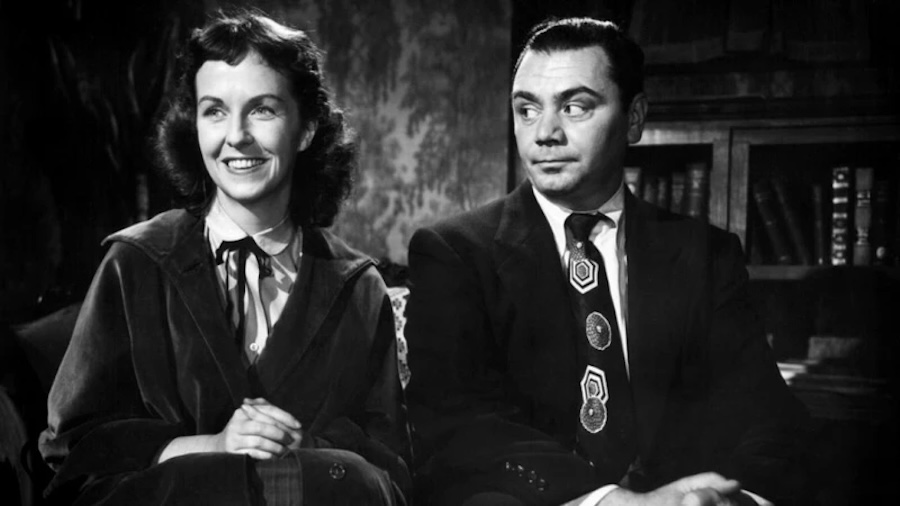
IT’S THE LOVE STORY OF AN UNSUNG HERO!

Paddy Chayefsky originally wrote this story as a teleplay, which was filmed in 1953 as part of The Goodyear Television Playhouse, an anthology series on NBC. Rod Steiger starred as Marty, but when the opportunity arose to turn the story into a feature film, Robert Aldrich allegedly suggested to director Delbert Mann that Ernest Borgnine should play the part. It made a star out of Borgnine and proved to the world that he could be even more effective in nice-guy roles than as a villain, which was the kind of work he was used to at the time. Borgnine made it impossible for the world not to be touched by his Marty.
The shame of being a bachelor
Brooklyn, New York. Marty Piletti (Borgnine) is a heavy-set, Italian-American butcher who has reached the age of 34 and seen every one of his siblings get married. Every day in the butcher shop the neighborhood’s older women tell him that he should feel ashamed of himself for being a bachelor. Marty is used to taking the same kind of crap from his mother (Esther Minciotti) and has learned to just keep quiet and not get into arguments. Marty has decided for himself that chasing women is no longer worth it; apparently, what they’re looking for is not something that Marty has. He’s tired of humiliating himself on the dance floor.
But his mother is very concerned and one evening Marty finally succumbs to her and agrees to join his buddies, also bachelors, and go to a popular place called the Stardust Ballroom. There he meets Clara Snyder (Betsy Blair), a plain-looking school teacher who’s been abandoned by her blind date. The two of them hit it off and spend the rest of the evening talking. However, their relationship is jeopardized by the fact that falling back into the same old rut is far too easy for Marty.
One of the most unusual Best Pictures
When the movie opened, it was celebrated by many critics but Marty still remains one of the most unusual films to win a Best Picture Oscar. Its tone is very low-key, the settings realistic, the story portrays some of the difficulties facing Italian immigrants in America; it simply lacks the kind of spectacle that tends to connect with the Academy, especially at that time.
Paddy Chayefsky makes us understand why that step may not be so easy to take.
Still, its positivity is irresistible. Most of us are suckers for this kind of love story – two not terribly interesting or attractive people see something magical in each other that no one else can see, and sparks fly. Borgnine and Blair (the latter blacklisted after the McCarthy hearings, but still earning this role after her husband, Gene Kelly, twisted MGM’s arm) are completely believable in those parts, especially Borgnine. He’s a sad but decent figure who is given an opportunity to change his life… but Chayefsky makes us understand why that step may not be so easy to take.
There’s also a difference from the TV movie, an added subplot that complicates events, involving Mrs. Piletti and her sister Catherine (Augusta Ciolli), both Italian immigrants who are sort of prisoners of the old way of life. A poignant scene has Catherine pointing out to her sister that as soon as Marty does find a girl and move out, her life will essentially be over because her husband is dead and there will be no one left to cook or care for.
The fact that Marty is still living with his mother at the age of 34 is another sign of stifling, conservative values of the era. Much has happened since. I’m also 34 and unmarried, but I’m not living with my mother and don’t have to put up with Marty’s social stigma. Still, if I don’t end up in a touching story like this, then I have a feeling that there is a limit to how “liberal” my fellow humans will be…
Marty 1955-U.S. 91 min. B/W. Directed by Delbert Mann. Screenplay: Paddy Chayefsky. Cast: Ernest Borgnine (Marty Piletti), Betsy Blair (Clara Snyder), Joe Mantell (Angie), Joe De Santis, Esther Minciotti, Augusta Ciolli.
Trivia: Co-produced by Burt Lancaster. The producers spent more money on the award campaign than they did making the movie. Minciotti, Mantell and Ciolli play the same parts as in the TV movie; Steiger was considered to reprise the lead role. Remade for Italian TV as Marty (1971).
Oscars: Best Picture, Director, Actor (Borgnine), Screenplay. BAFTA: Best Foreign Actor (Borgnine), Foreign Actress (Blair). Golden Globe: Best Actor (Borgnine). Cannes: Palme d’Or.
Last word: “It was part of my life. I’ve always been that kind of person that was laid back. I was afraid to – not afraid or ashamed – but I was just one of those guys that stood there in the corner and hey, that’s Marty. When I saw this part I said, ‘My God, I’m going to relive my life again. So, when they gave it to me and a lot of people don’t know this, but Marty was actually made to be a tax loss. They only wanted to make half of the picture and then shelve it. And then the tax man said no, you’ve got to make it all, show it one time and then you can put it on the shelf. So, I made $5,000 for the entire picture with a promise of $5,000 more if I signed a 7-year contract, which cost me a half a million dollars to get out of. It was a wonderful picture and it was easy to make. We made the whole thing in 14 shooting days.” (Borgnine, CBS)
